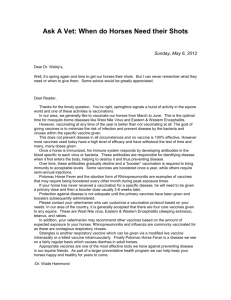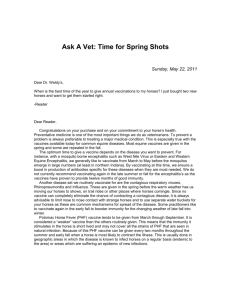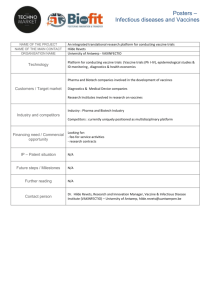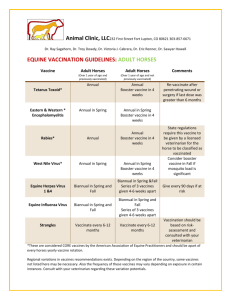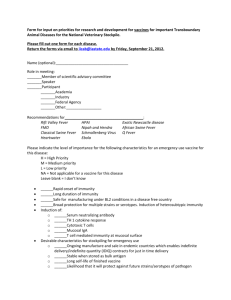Early Spring 2006
advertisement
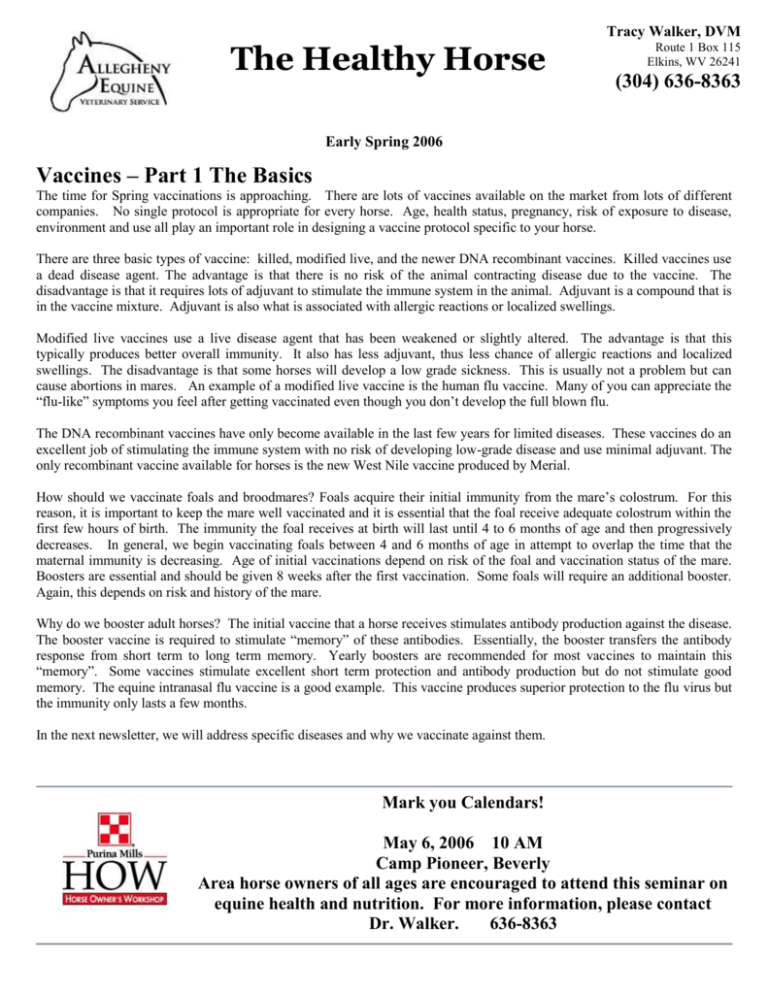
Tracy Walker, DVM The Healthy Horse Route 1 Box 115 Elkins, WV 26241 (304) 636-8363 Early Spring 2006 Vaccines – Part 1 The Basics The time for Spring vaccinations is approaching. There are lots of vaccines available on the market from lots of different companies. No single protocol is appropriate for every horse. Age, health status, pregnancy, risk of exposure to disease, environment and use all play an important role in designing a vaccine protocol specific to your horse. There are three basic types of vaccine: killed, modified live, and the newer DNA recombinant vaccines. Killed vaccines use a dead disease agent. The advantage is that there is no risk of the animal contracting disease due to the vaccine. The disadvantage is that it requires lots of adjuvant to stimulate the immune system in the animal. Adjuvant is a compound that is in the vaccine mixture. Adjuvant is also what is associated with allergic reactions or localized swellings. Modified live vaccines use a live disease agent that has been weakened or slightly altered. The advantage is that this typically produces better overall immunity. It also has less adjuvant, thus less chance of allergic reactions and localized swellings. The disadvantage is that some horses will develop a low grade sickness. This is usually not a problem but can cause abortions in mares. An example of a modified live vaccine is the human flu vaccine. Many of you can appreciate the “flu-like” symptoms you feel after getting vaccinated even though you don’t develop the full blown flu. The DNA recombinant vaccines have only become available in the last few years for limited diseases. These vaccines do an excellent job of stimulating the immune system with no risk of developing low-grade disease and use minimal adjuvant. The only recombinant vaccine available for horses is the new West Nile vaccine produced by Merial. How should we vaccinate foals and broodmares? Foals acquire their initial immunity from the mare’s colostrum. For this reason, it is important to keep the mare well vaccinated and it is essential that the foal receive adequate colostrum within the first few hours of birth. The immunity the foal receives at birth will last until 4 to 6 months of age and then progressively decreases. In general, we begin vaccinating foals between 4 and 6 months of age in attempt to overlap the time that the maternal immunity is decreasing. Age of initial vaccinations depend on risk of the foal and vaccination status of the mare. Boosters are essential and should be given 8 weeks after the first vaccination. Some foals will require an additional booster. Again, this depends on risk and history of the mare. Why do we booster adult horses? The initial vaccine that a horse receives stimulates antibody production against the disease. The booster vaccine is required to stimulate “memory” of these antibodies. Essentially, the booster transfers the antibody response from short term to long term memory. Yearly boosters are recommended for most vaccines to maintain this “memory”. Some vaccines stimulate excellent short term protection and antibody production but do not stimulate good memory. The equine intranasal flu vaccine is a good example. This vaccine produces superior protection to the flu virus but the immunity only lasts a few months. In the next newsletter, we will address specific diseases and why we vaccinate against them. Mark you Calendars! May 6, 2006 10 AM Camp Pioneer, Beverly Area horse owners of all ages are encouraged to attend this seminar on equine health and nutrition. For more information, please contact Dr. Walker. 636-8363 Equine Emergency Review: Choke Choke, or esophageal obstruction, is an emergency that you should learn to recognize. In people, we associate choke with a blockage of the trachea. In horses, choke is associated with an obstruction in the esophagus, not the trachea. The obstruction is usually at the bottom of the esophagus just before the entrance to the stomach. A horse that is choking will act very depressed, usually holding the head at or below the withers. Saliva and mucous mixed with food material will be draining out of one or both nostrils. Some horses will attempt to drink by dunking their nose, but they will not actively swallow. Affected horses typically do not attempt to continue eating. Regardless, access to additional food or hay should be immediately eliminated. Choke can be caused by a variety of factors. Poor dental health is one of the most common causes. Abnormalities in the dental arcade, such as a wave mouth or sharp points, prevent proper mastication of feed. Older horses are especially at risk since the molars are very worn or missing. In addition, some feed types such as alfalfa cubes, bran, beet pulp are more likely to cause an obstruction. These dry or highly compressed feeds soak up saliva and can expand too rapidly as they are being swallowed. To prevent this rapid expansion, such feeds should be soaked with water prior to feeding. Regardless of the cause, immediate treatment by your veterinarian is needed. Treated early, choke can be cured without complication. However, if a choke is allowed to persist, permanent damage can occur to the lining of the esophagus. Aspiration pneumonia can also occur from inhaling some of food/saliva mixture into the lungs. Both of these complications are very serious and can lead to death. Treatment includes sedation to lower the head and relax the esophagus. A stomach tube is then passed to help dislodge the obstruction and push it gently on to the stomach. Occasionally, water is flushed in to loosen, break up and lubricate the obstruction. Antibiotics and additional medical therapy may be given depending on the individual case need. Recurrence of choke is most likely during the first 48 hours after an episode. During this time, the lining of the esophagus is still irritated. Horses that have suffered from recurring choke may require special dietary management and vigilant dental care. Should this occur to your horse…….1) Call your vet. 2) Remove all feed & hay from the stall. 3) Try to keep his head lowered. This reduces the chance of aspirating food material into the trachea. 4) Do not try to flush or force a water hose into the mouth. This will only stress the horse and increase the chance of aspiration. Check out the website at Tracy Walker, DVM Route 1 Box 115 Elkins, WV 26241 www.alleghenyequine.com. 2006 Area Equine Events April 1 10 AM 2 10 AM 4-H & Open Schooling Show Hosted by The Pony Garage at Camp Pioneer, Beverly. Contact Sonya Penson for more info and show bill @ 304-636-6711 Health Clinic hosted by Dr. Tracy Walker at Camp Pioneer, Beverly Health exams, vaccinations and coggins. RCRRC activity at Camp Pioneer NWVQHA Show at Barbour Fair Grounds NWVQHA Show at Barbour Fair Grounds Parelli Level 1 & 2 Clinic @ Shalimar Farm, Cass For more info call 304-653-8547 8/9 8/9 14, 15/16 29/30 May 6 9:00 AM 27 26, 27/28 Purina Nutrition Seminar at Camp Pioneer hosted by Dr. Tracy Walker . RSVP appreciated for head count. 304-636-8363 or trwalker3@aol.com RCRRC Benefit Ride at Ross Farm (new trail) NWVQHA Show at Barbour Fair Grounds June 17 10 AM 26-30 Tri-County/ RCRRC Merging Open Show at Camp Pioneer Greenbrier River Trail Ride (all invited to attend all or part) July 29/30 NWVQHA Show at Barbour Fair Grounds August 13 12/13 26 RCRRC Benefit Ride in Huttonsville (new trail) NWVQHA Show at Barbour Fair Ground 2nd Annual RCRRC Summer Celebration Horse Show Camp Pioneer September 9/10 9/10 17 23/24 Mule Show in Flatwoods (trail ride on the 9th) NWVQHA Show at Barbour Fair Ground Dry Fork Ride (may be a 2-day event beginning on the 16th) new trail NWVQHA Show at Barbour Fair Ground For more information on Randolph County Regional Riding Club events, Please contact Diane Ross @ 636-7486 or onthefarmat40@hotmail.com Regular Meetings are held every 3rd Thursday. Events are also posted at www.alleghenyequine.com If your organization has any events that you would like to include on this calendar, please email Dr. Walker at trwalker3@aol.com
